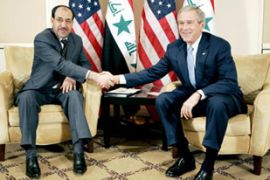No let-up in Iraq violence
Attacks around the country kill 12 while US forces clash with al-Qaeda fighters.

Baghdad echoed with the sounds of machinegun fire as Iraqi soldiers clashed with fighters in the Fadhel neighbourhood, wounding nine people, including three soldiers.
Iraqi state television described the clashes as an operation against “terrorist hideouts” in the commercial heart of the city.
Policemen killed
In the southern city of Samawa, clashes between security forces and armed elements continued into a second day, with two policemen being killed on Friday.
A man was also killed in Iskandariya, just south of Baghdad, when a roadside bomb exploded next to a mini-bus.
American forces conducted several raids in and around Baghdad on Friday, killing two fighters and wounding an Iraqi woman the men were using as a “human shield”, the US command said.
Military raids
The US military raids targeted al-Qaeda in Iraq fighters occurred early on Friday in Baghdad, the town of Yusufiya to the south, and two locations to the north: near Taji, the US air force base, and the town of Tarmiya.
In the Taji area, multinational forces fought with fighters, killing one and “wounding a female local national who was being used as human shield by the terrorist”, the US command said in a statement.
The female, whose name and age were not given, was hospitalised in stable condition, the US military said.
American soldiers also detained 14 suspected fighters during the raid, including “a known foreign fighter facilitator” who was not identified.
It was the third time in less than a week that Iraqi women have been killed during US raids.
In the capital, sectarian violence killed at least six Iraqis and wounded 39 on Friday, police said, and a Sunni-Arab mosque was attacked by men armed with rocket-propelled grenades.
Widening revolt
Meanwhile, there was no sign that Nuri al-Maliki, the Iraqi prime minister, was having any luck stopping a widening revolt within his divided government.
On Thursday, two senior Sunni politicians joined prominent Shia legislators and cabinet members in criticising his policies. Tariq al-Hashemi, vice president, said he wanted to see al-Maliki’s government gone and another “understanding” for a new coalition put in place with guarantees that ensure collective decision making.
“There is a clear deterioration in security and everything is moving in the wrong direction,” the Sunni leader said. “This situation must be redressed as soon as possible. If they continue, the country will plunge into civil war.”
Sadrist grouse
Al-Maliki’s No 2, Salam Zikam Ali al-Zubaie, the deputy prime minister, also a Sunni, argued that the president’s government failed to curb the spread of sectarian politics.
The boycott by 30 lawmakers and five cabinet ministers loyal to anti-American Shia leader Moqtada al-Sadr was in protest at al-Maliki’s meeting with George Bush, the US president, in Jordan on Thursday.
The Sadrists said the meeting amounted to an affront to the Iraqi people.
Al-Maliki appealed to the Sadrists to end their boycott and admonished them for an action that he said violated the commitment expected from partners in his six-month-old coalition government.
Falah Hassan Shanshal, a Shia legislator with the Sadrist group, said the boycotters will await the reaction to the UN Security Council vote to extend for one-year the mandate of the 160,000-strong multinational force by Iraq’s 275-seat parliament when it meets next on Tuesday.